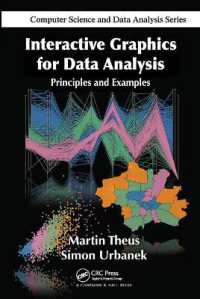- ホーム
- > 洋書
- > 英文書
- > Philosophy
Full Description
Evil threatens human reason, for it challenges our hope that the world makes sense. For eighteenth-century Europeans, the Lisbon earthquake was manifest evil. Today we view evil as a matter of human cruelty, and Auschwitz as its extreme incarnation. Examining our understanding of evil from the Inquisition to contemporary terrorism, Susan Neiman explores who we have become in the three centuries that separate us from the early Enlightenment. In the process, she rewrites the history of modern thought and points philosophy back to the questions that originally animated it. Whether expressed in theological or secular terms, evil poses a problem about the world's intelligibility. It confronts philosophy with fundamental questions: Can there be meaning in a world where innocents suffer? Can belief in divine power or human progress survive a cataloging of evil? Is evil profound or banal? Neiman argues that these questions impelled modern philosophy. Traditional philosophers from Leibniz to Hegel sought to defend the Creator of a world containing evil.
Inevitably, their efforts--combined with those of more literary figures like Pope, Voltaire, and the Marquis de Sade--eroded belief in God's benevolence, power, and relevance, until Nietzsche claimed He had been murdered. They also yielded the distinction between natural and moral evil that we now take for granted. Neiman turns to consider philosophy's response to the Holocaust as a final moral evil, concluding that two basic stances run through modern thought. One, from Rousseau to Arendt, insists that morality demands we make evil intelligible. The other, from Voltaire to Adorno, insists that morality demands that we don't. Beautifully written and thoroughly engaging, this book tells the history of modern philosophy as an attempt to come to terms with evil. It reintroduces philosophy to anyone interested in questions of life and death, good and evil, suffering and sense.
Featuring a substantial new afterword by Neiman that raises provocative questions about Hannah Arendt's take on Adolf Eichmann and the rationale behind the Hiroshima bombing, this Princeton Classics edition introduces a new generation of readers to this eloquent and thought-provoking meditation on good and evil, life and death, and suffering and sense.
Contents
Preface to the Paperback Edition xi Acknowledgments xix Introduction 1 Chapter One: Fire From Heaven 14 God's Advocates: Leibniz and Pope 18 Newton of the Mind: Jean-Jacques Rousseau 36 Divided Wisdom: Immanuel Kant 57 Real and Rational: Hegel and Marx 84 In Conclusion 109 Chapter Two: Condemning the Architect 113 Raw Material: Bayle's Dictionary 116 Voltaire's Destinies 128 The Impotence of Reason: David Hume 148 End of the Tunnel: The Marquis de Sade 170 Schopenhauer: The World as Tribunal 196 Chapter Three: Ends of an Illusion 203 Eternal Choices: Nietzsche on Redemption 206 On Consolation: Freud vs. Providence 227 Chapter Four: Homeless 238 Earthquakes: Why Lisbon? 240 Mass Murders: Why Auschwitz? 250 Losses: Ending Modern Theodicies 258 Intentions: Meaning and Malice 267 Terror: After September 11 281 Remains: Camus, Arendt, Critical Theory, Rawls 288 Origins: Sufficient Reason 314 Afterword to the Princeton Classics Edition 329 Notes 351 Bibliography 361 Index 369








